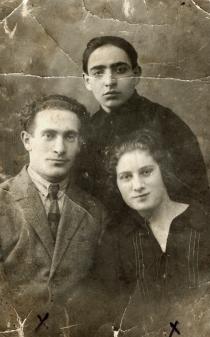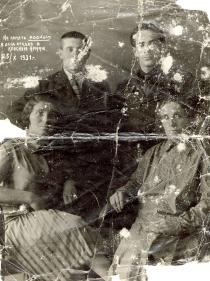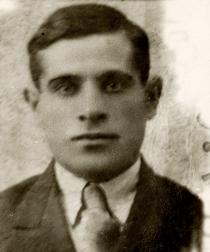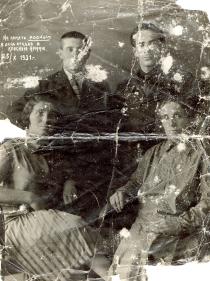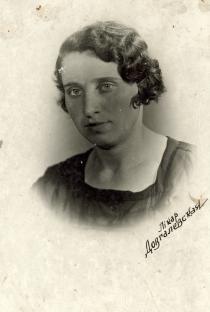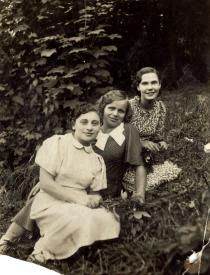
Klara Dovgalevskaya
Kiev
Ukraine
Interviewer: Vladimir Zaidenberg
Date of interview: December 2001
Interviewer's Note: This was a very difficult interview. I had to return to Klara Dovgalevskaya three times because of her poor health. Afterwards, she got very tired and shared nothing about her life after the war. She asked me to finish the interview at that point.
My family background
Growing up
During the war
Post-war
Glossary
My name is Klara Dovgalevskaya. When I was young I was called Khaya. I was born in the village of Tripolye, Ukraine.
I never knew my paternal grandparents; I don't even know their names. My father, Leizer Dovgalevsky, was a merchant. He had his own small one-room store in Tripolye. He went around villages buying various staple food products - grain, flour, bread, sugar, salt - which he then sold in his store. I remember that during his lunch break my mother, Esfir Dovgalevskaya, would run to work for him while he went home to eat, and then he would go back to the store and my mother would come home. My mother worked from dawn to dusk. They worked a lot and our family was not poor.
We had a big house. My paternal great-grandfather built the house. It was a good-sized house with several rooms: a living room, a boys' bedroom, a girls' bedroom, and our parents' bedroom. But the toilet was outside, and water for the bath was heated only once a week for my mother to wash us one by one. I remember we had a big garden and three cows. One of the cows was very smart, but wild. She could open the gates with her horns, and would come to our kitchen window and call my mother. She loved mother very much. In the mornings I woke up early, ran to the kitchen, and my mother would give me a glass of warm, fresh milk.
Our parents had seven children. The eldest was my brother Moishe, born in 1900. Then came Aba, born in 1903, followed by Pinya in 1905. My sister Buzya was born in 1907; in 1910 came brother David; and in 1912 my sister Sonya. I, the youngest, was born in 1914. I was born on the first day of Passover.
My mother said that those were hard times then, probably due to the start of World War I. It was more difficult for my father to buy products in the villages, and life became harsher. My mother worked a lot around the house while my elder sister Buzya took care of me. My mother would put a scarf around Buzya's neck and shoulders, put me inside it, and Buzya would walk with me everywhere.
I can vaguely remember our Passover celebrations. I remember that at Passover my father sat at the head of the table, with the boys sitting on his right hand and the girls on his left. My mother served the food. My father took me on his lap and lifted me up; I remember dancing on his lap and singing. And then, suddenly, I pissed. My father got angry and put me down. I remember it very vividly even though I was only two years old.
My parents and the elder children spoke Yiddish at home. The children went to cheder. After that they attended a Ukrainian school in Tripolye. My elder brother Moishe left for Kiev in 1916.
Then our family suffered a terrible tragedy. In 1918-1919 there were gangs in Tripolye that consisted of 15-20 men. They would come to villages, and rob and kill Jews. One of the gang leaders was Zelyony, the son of the priest from our village. When his gang came into our village, he would put a soldier next to our gates and say, 'This kike is a good one. We should protect him.'
My elder brother Pinya was not living with us at the time. Once some Komsomol 1 members came from Kiev to our village to fight against the gangs. They were all young men and women, without any training or knowledge of how to fight against bandits. So, the bandits encircled them and put them into the basement of my father's store. They also posted guards there. My brother Pinya, who was 14 years old, decided to rescue them. He went to the store and began digging in the ground in order to reach the basement. The guards saw him and shot him, wounding him in the leg. He dived into the river to escape them, and my mother lost communication with him for a long time. Later, we found out that he had managed to reach Kiev and got to the hospital there. His leg was amputated and he remained handicapped for the rest of his life.
After this event, some time later, another gang burst into Tripolye. They came into our house and one of them slashed my father on the head with his saber. I saw that happen. My brother Aba rushed to defend my father, but he was also slashed by the saber. My father died at once. Aba ran out of the house, still alive.
After the gang attacked our house and killed my father, they raped my mother. I did not understand what was going on, but my mother was crying and begging, 'Please, don't kill me, my children are so young! Do you see how young my girl is? She will not live without me.' She also motioned for me to leave and so I went to another room. When everything was over, my mother ran to me, took me in her arms and ran out of the house, running without any purpose.
I followed after her, holding tight onto her skirt. All the other children had run away in fright, I alone stayed. She found Aba sitting against a wall, dead. My mother touched him, and I was crying with fear that the bandits would come and kill my mother and me as well. As it turned out, when Aba ran out of the house, the bandits caught him and put him against the wall and began to shoot at him. But their bullets did not hit him. Later my mother said, 'He died from fear'.
On that night, my mother sent my sister and me to spend the night with an old Jewish couple. They lived in a semi-basement. At night, the bandits burst into their home and beat them to death with ropes. I can still hear their cries as if it happened yesterday. The bandits did not find us, so my sister and I remained alive. Early in the morning, when it was still dark, my mother took us away. The next night, which was our last night in Tripolye, the priest's wife allowed us to stay with her. It was very hot where she put us to sleep, and I remember constantly asking her for something to drink. But nobody gave me a drink because they where afraid that the bandits, who also stayed in that house, would find us out. I don't know where my mother with my brother and other sister spent that night.
In the morning, those of us Jews who remained alive, around 15 people, found a boat and crossed the Dnepr River. We went to Kiev along the other side of the Dnepr. I don't remember how many days the journey took us. I only remember that my mother carried me. My mother was wearing only an underskirt, because she had no time to dress when she left the house. So she covered me with this underskirt when we stayed at an empty bakery. Its owner let us stay there. My brother David walked, holding my mother's hand and crying all the time: 'Oy, meyne fiselekh!' [Yiddish: Oh, my feet!] When we came to Kiev, the feet of my mother and my brother were very swollen.
I don't remember how, but my mother found some of my father's relatives in Kiev. I think it was his cousin's family, because his last name was also Dovgalevsky. The cousin was not in Kiev at the time, he had left for America, but his family was still living in Kiev, downtown, in a rich, nice house. His wife accepted us. But we did not stay long at that house. The family moved to America, too. I don't even remember their names. We had to move out of their flat. My mother found us a tiny room where we all lived.
In Kiev my mother found Pinya, my elder brother, who had had his leg amputated and who now walked on crouches. My eldest brother Moishe found a job at a bakery, and every day he brought us bread. It was so good! Pinya, the invalid, sold cigarettes; he hung a tray with cigarettes on his neck and sold them.
At that time my mother's mother, my grandmother, came to live with us. I don't remember her name. I only remember that she was very old and blind and she was in bed all the time. I would get into her bed, and she would tell me Bible stories about the Jews. I asked my mother, 'How come grandmother looks into the Bible and reads, being blind?' Mother said, 'No, she does not read; she knows all the words by heart'.
While my grandmother was still alive, my mother would buy matzah for Passover, and my grandmother would tell us all about Moses and the exodus from Egypt. My brothers criticized our grandmother. They said there was no God, for if He existed, He would never have let anyone kill our father and brother and cast us out of our house in Tripolye. To this my grandmother replied: 'God punishes us for the sins of our forefathers'.
I was sent to the Jewish orphanage. It was located in Podol 2, near the synagogue. The times were hard; there was a famine in Ukraine 3 after the Revolution of 1917 4, so the synagogue organized an orphanage for young orphans. We were fed and taught there. We did not study religion, but we danced and sang Jewish songs. I still remember them. In the beginning I lived at the orphanage, but then my mother began to take me home every day and I went back there every morning, so the orphanage became more like a kindergarten for me. The synagogue fed the older children as well. They did not stay at the orphanage, but simply came there every day to eat. My brothers and sisters came too. I don't know how our family would have survived had it not been for the synagogue. I spent two or three years in that orphanage.
Then we moved to another flat, also small, and lived there until 1941. I only started going to school when I was already 8 years old because I was so very weak and ill. It was hard for me to study, so my elder sister and brothers helped me. We had a mixed class: boys and girls together. The school was Russian. The students were of different nationalities: Russians, Ukrainians, and Jews. I was friends with all of them; they all looked the same to me.
But in our yard children teased me: 'Khaya is a zhyd [kike]! Khaya is a zhyd [kike]!' It took me a while to understand what they were teasing me for. Only later did I understand that I was Jewish and that this was the reason why my father and brother were killed, my mother raped, and why the whole yard teased me.
I studied only for 4 years, finished elementary school and then attended a factory college. Our life was very hard financially; my mother did not work, so I could not stay at school. At the factory college we studied one day and worked one day. We were also taught such regular school subjects as mathematics, physics, geography, and drawing. Every other day we took a tram and went to the factory where we were taught bench work. I liked it, although I cannot say that my dream was to become a metalworker. I did not care; I only wanted to learn some profession in order to be able to earn a living. We received no payment for our work, but we got fed every day. We ate soups that were not very tasty, so children who were richer than me, gave theirs to me. I was happy to eat mine and their portions as well.
My elder sister Buzya married her cousin Yefim Dovgaletsky. She never worked outside her home; she was a housewife. My sister Sonya studied at the Medical Institute. She also worked as a nurse at the hospital part-time at nights, and studied during the day. She very much wanted to become a doctor. My brother Pinya worked at the knitting factory. It was a factory where invalids were employed, and he was chief of the section that prepared yarn. Before his army service, my brother David was a worker. He was called up in 1931. I still have a photo of him with our mother, Sonya and Pinya, taken right before David went to serve in the army. My brother Moishe worked at the bakery, but by then it became a plant.
When David returned from the army and saw my hands, he was shocked. My hands were covered with calluses, because I worked with metal. He made me quit this heavy job. Then I worked at the same knitting factory as my brother Pinya. I worked with the knitting machine. David forced me to study all the time. He said, 'Look what nice girls are working at the office. You should study too!'. I finished a course for bookkeepers and for a short while, it was already 1940, I worked as a bookkeeper.
In the 1930s I and my brothers and sisters, joined the Komsomol. We loved Soviet holidays very much. I remember that on 1st May we always came together at the Dynamo stadium, wearing sports suits and marching in demonstrations along Kreschatik Street [the main street of Kiev]. We also celebrated the October Revolution Day 5 and New Year's Eve. At that time, we no longer celebrated any Jewish holidays, as we were all Komsomol members, and Pinya was a member of the Communist Party.
Right before the war the atmosphere was disquieting because of talk about Hitler. I did not read newspapers, so I don't remember now if there was any information about Hitler's negative attitude towards the Jews. I think my mother knew about it from newspapers and was very anxious. My brother David and sister Sonya were mobilized even before the war. David was in the reserve and Sonya was a doctor. We understood that since mobilization has started, there would be a war.
The war [the Great Patriotic War] 6 broke out on 22nd June 22. It was not until noon that we learned that Germany had attacked us. I went to the military enlistment committee because I wanted to fight at the front. They registered my profession and said that when the army needed people from these non-military professions, we would be called. But nobody called.
When the war broke out, my mother was not in town. She, my sister Buzya, and mother's four young grandchildren were in Brovakhy village. There was a collective farm there, where Yefim Dovgalevsky, Buzya's husband, was working. He went there every spring to fix tractors. So, Buzya with her children and our mother went there every summer as well. That's where the war found them.
In Kiev evacuation started at my work place. I tried to get in touch with my mother but I failed. My elder brother Moishe was working at the Bolshevik plant at the time. He insisted that I evacuate together with him. I remember that during the evacuation bombing raids were frequent. We were put on an open locomotive platform together with tanks and other military equipment. This is how we went to evacuation in Sverdlovsk.
My brother stayed at the Uralmash [a heavy machine building plant] in Sverdlovsk with the equipment and machines, and we, who were working at the plant, were sent to villages. I found myself in the village of Boiny, where I lived until 1944. We worked at the collective farm, sewing, digging, loading and unloading sacks with vegetables and other products.
All the time I was trying to find out what was going on with Sonya, David and my mother. I wrote to military units, to the village where my mother was supposed to be staying, but I learned the horrible truth only after I returned to Kiev. I came back to Kiev in the summer of 1944. Kreschatik Street was ruined; houses had been blown up. Our basement was also destroyed. I found a photo album and a picture of my sister Sonya at her graduation. There were no clothes in our flat. But there were many rats, because our basement was used as a vegetable warehouse during the war.
Once at the market a woman approached me and said, 'Are you Klara Dovgalevskaya? I can tell you about your family.' Buzya's husband, Yefim Dovgalevsky, went to Brovakhy village to take them away before Hitler's coming. On his way there, he met some Ukrainian friends, who gave him a lot to drink, got him drunk, then took all of his money and killed him with an axe. They left his body in the forest, where it was found by the locals. Before the fascists came, the locals hid my mother, Buzya and her children in someone's basement. A neighbor took the oldest girl, Firochka, to stay with her. She said, 'Let her stay with me. If something happens, she will live'. When the fascists came, somebody betrayed my family. Mother, Buzya and the children were led out of the basement put on horses and taken into the forest. They also took the owner of the horses. In the forest he was ordered to dig a grave. My mother was thrown into that grave and buried alive. Buzya and her small children were shot. The man who was ordered to dig the grave told that story. Firochka, Buzya's oldest daughter, remained at the neighbor's. Once, a woman in the village quarreled with this neighbor and told her that she would let the Germans know about the Jewish girl. So, this neighbor took Firochka to the commandant's office, and she was also shot.
My sister Sonya was killed in Kiev. A neighbor from our yard told me how it happened. Sonya served in the army and took part in the defense of Kiev. When the Germans were already in Kiev, she came to our house. She was not wearing her military uniform, but a light Ukrainian blouse. From her friend Manya she took the keys to our flat that I had left for her, went into our flat, and began to look for some clothes. It was late September, rainy and cold. She asked Manya for a coat, but Manya said there were no clothes there, that the Germans had probably stolen everything. But Sonya should have had her own keys! So, Manya went out of the yard behind Sonya and pointed her out to the Germans who were passing by. They caught up with Sonya and took her with them. The neighbors said they saw that Sonya and other Jewish women were led out of the Gestapo gates on Vladimirskaya Street and put on a truck. Rumor has it that they were taken to Babi Yar 7 and shot there.
In the mid-1960s, my brother Pinya met a man who said he knew David Dovgalevsky. He said he was together with him in the encirclement of Kiev and in the camp for prisoners of war in Darnitsa [industrial zone of Kiev]. Thousands of Soviet prisoners of war were kept under the open sky, without food, without water in that camp. Many people died every day. Their relatives saved many of them, though. Ukrainians were saved by their wives and mothers, who paid for their release in gold and valuables. That's how that man got saved. But David was killed, because all the Jews were killed there. That's what that man told my brother. So, after the war I was left practically alone. My mother, my sisters, and one of my brothers were killed just because they were Jewish.
My brother Pinya and his wife returned to me from evacuation. Their son Abrasha was killed together with my mother, Buzya and her three children in that village in 1941. After the war, Pinya continued to work and headed a workshop of the invalids' factory. He died in 1968. My eldest brother Moishe also returned from Sverdlovsk. He continued to work at the Uralmash plant. He died in 1974.
After the war the situation of the Jews worsened in general. I could not find a job for a long time because I was Jewish. On the bus people would always say, 'Oh, too many zhyd [kikes] have come here. We are moved out of our flats so that they could move in. First they did not want to fight in the war, and now they want to return to their Kiev flats.' It was very hard. I bore this burden my whole life, since the moment my father was killed.
So I decided that my children would never be Jewish. When I was 35, I began to date my boss, Valentin Zaritsky, who was half Ukrainian, half Polish. I understood that he would not stay with me for long because I was not very beautiful. But I wanted to have children. He and I lived officially together for only two months, but I had twins from him, and then he left me.
My sons, Valery and David Zaritsky, were born in 1951. Both my sons are Ukrainians. I did my best to help them identify with Ukrainians. It was very hard for me to bring them up. They spent many years in a boarding school and then in a vocational school. One of them is an electrician, the other a metalworker. Valery lives with me; he is still single. David has a family.
Life is very hard now. If it was not for the aid of the Jewish community, we would have starved already. I really appreciate their help. It is hard for me to speak now. And I don't really have much to add.
